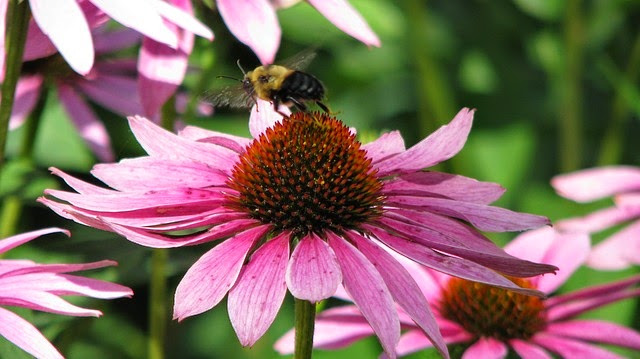Post contributed by Mary, crew member of Youth Outdoors Crew 2:
 This week is
national pollinator week! It was created to celebrate and support pollinating
animals, which include bees, butterflies, bats, beetles, flies, birds, small
mammals and more. Pollinators are
essential members of every ecosystem and help 90% of flowering plants reproduce
including a third of crops worldwide. With increased chemical use, pathogens,
and disappearing habitat and food sources, pollinator populations have been in
decline and they need our help.
This week is
national pollinator week! It was created to celebrate and support pollinating
animals, which include bees, butterflies, bats, beetles, flies, birds, small
mammals and more. Pollinators are
essential members of every ecosystem and help 90% of flowering plants reproduce
including a third of crops worldwide. With increased chemical use, pathogens,
and disappearing habitat and food sources, pollinator populations have been in
decline and they need our help.
You can
celebrate pollinator week by planting native flowering plants in your gardens
and choosing not to use pesticides that are harmful to the bees and
butterflies. Neonicotinoids are a widely used family of insecticides, most
commonly applied to ornamental plants in urban gardens to target aphids and
beetles. They are systemic in plants so
when they are added to the soil, the plant takes it up as it grows and it is
incorporated into the leaves, flowers, pollen, and nectar. Thus, if it is used
in a nursery and then transported to your garden, the insecticide will still be
active in the plant and can even enter neighboring plants or plants grown the
next season. Neonicotinoids affect the nervous system and attack connections in
the brain, which can lead to problems with navigation, flying, ability to learn
new tasks, and general foraging ability. Bees are especially vulnerable to
neonicotinoids because they have more of the targeted receptors and more memory
and learning genes than other insects. It has also been found that exposure to
neonicotinoids may make bees more susceptible to parasites and pathogens. Making
sure you purchase plants from nurseries that do not use neonicotinoids is
incredibly important for the health of bees and ecosystems in general.

The European
Union has suspended the use of certain neonicotinoids for a period of two years
due to the effects they are having on bees. The EPA is re-evaluating the use of
neonicotinoids through registration review, but has made no new restrictions
yet.
To learn more:
http://www.xerces.org/wp-content/uploads/2012/03/Are-Neonicotinoids-Killing-Bees_Xerces-Society1.pdf
http://bees.pan-uk.org/home
 This week is
national pollinator week! It was created to celebrate and support pollinating
animals, which include bees, butterflies, bats, beetles, flies, birds, small
mammals and more. Pollinators are
essential members of every ecosystem and help 90% of flowering plants reproduce
including a third of crops worldwide. With increased chemical use, pathogens,
and disappearing habitat and food sources, pollinator populations have been in
decline and they need our help.
This week is
national pollinator week! It was created to celebrate and support pollinating
animals, which include bees, butterflies, bats, beetles, flies, birds, small
mammals and more. Pollinators are
essential members of every ecosystem and help 90% of flowering plants reproduce
including a third of crops worldwide. With increased chemical use, pathogens,
and disappearing habitat and food sources, pollinator populations have been in
decline and they need our help. 